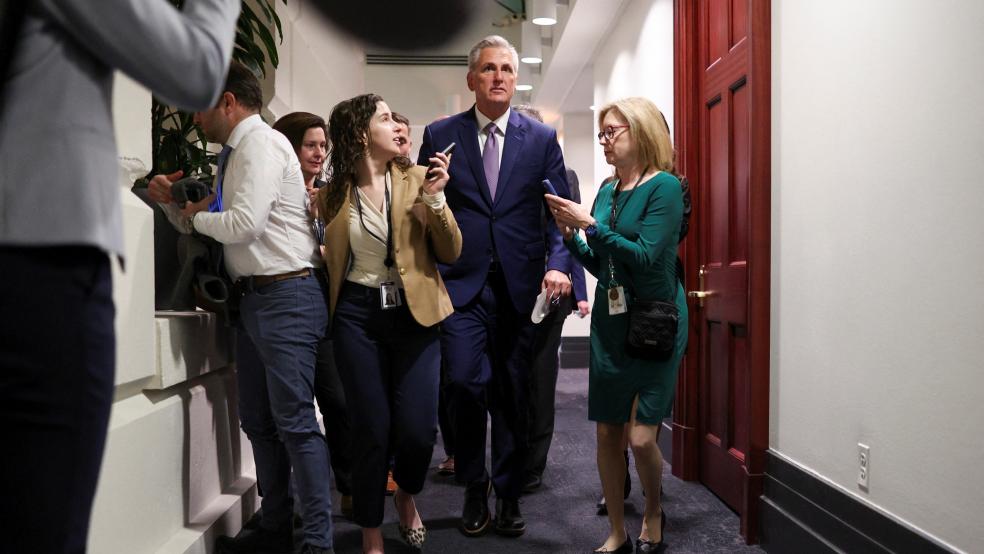The House on Wednesday narrowly passed House Speaker Kevin McCarthy’s package to raise the debt limit into next year and cut trillions of dollars in federal spending. The vote was 217-215, with four Republicans joining Democrats in voting against the bill.
As close as it was, the vote represents a victory for McCarthy (R-CA) in his effort to force President Joe Biden to engage in negotiations over raising the federal borrowing limit in exchange for Republican demands. It has already led to calls from outside groups such as the Business Roundtable and the Committee for a Responsible Federal Budget for Democrats to come to the table, and the pressure is likely to grow as lawmakers, investors and others get increasingly jittery about the possibility of a default.
Biden insisted Wednesday that he’s not going to negotiate on the debt ceiling or reward Republican brinkmanship. “I’m happy to meet with McCarthy, but not on whether or not the debt limit gets extended forever. That’s not negotiable,” he said.
The White House has insisted that lawmakers should raise the limit without strings attached, as they have done before, and that Republicans should not place the full faith and credit of the United States at risk. Biden has threatened to veto the GOP bill if it gets to his desk, but the legislation will be dead on arrival in the Senate, leaving the path forward unclear. The debt limit will need to be raised this year, possibly as soon as early June, to avoid a default that would rattle markets and the economy.
McCarthy agrees to late changes: The House vote came after McCarthy made a couple of major concessions in the wee hours of the morning to win over GOP holdouts who threatened to scuttle his plan. Republican leaders had insisted that they would not open the bill up, with some indicating that they had reached a “take it or leave it” stage in talks.
Ultimately, though, McCarthy agreed to some changes sought by his members. Conservatives wanted to speed the proposed implementation of stricter work requirements for low-income beneficiaries of Medicaid and food stamps, changing the timeframe from 2025 to 2024. And Midwestern Republicans wanted to avoid having tax breaks for biofuels like ethanol repealed. Those credits were enacted last year as part of Democrats’ Inflation Reduction Act, which House Republicans want to reverse.
In the end, much as he did through the 15 grueling rounds of votes it took to be named speaker, McCarthy made the concessions he needed to make to get the result he wanted.
The White House has been criticizing the GOP bill and blasted the late changes. “Speaker McCarthy has cut a deal with the most extreme MAGA elements of his party to accelerate taking food assistance from hundreds of thousands of older Americans and to carve out one industry from his draconian cuts,” White House Communications Director Ben LaBolt said in a statement, adding that the bill would still “strip away health care services for veterans, cut access to Meals on Wheels, eliminate health care coverage for millions of Americans, and ship manufacturing jobs overseas.”
What’s next: McCarthy may have demonstrated that his conference is united behind his plan, but it’s not clear that House passage of the Limit, Save, Grow Act will bring Congress and the president any closer to raising the debt limit and avoiding a potential economic catastrophe. “The GOP’s Default on America Act does not bring us any closer to avoiding the first-ever default. In fact, it only brings us dangerously close to default,” Senate Majority Leader Chuck Schumer (D-NY) said Wednesday.
The outlook is also complicated by the insistence of some House Republicans that they won’t accept anything less than the package they’ve put together. "I wanted double what was in there. I agreed to vote for it because that starts the ball and gets us in the arena to solve the debt problem,” Rep. Ralph Norman (R-SC), a member of the conservative House Freedom Caucus, told reporters. “Now, I’m not interested in anything coming back, anything but what we voted for.”
The bottom line: McCarthy scored a much-needed win that solidifies his negotiating power, but it’s not clear yet that will yield any real progress toward raising the debt limit.





